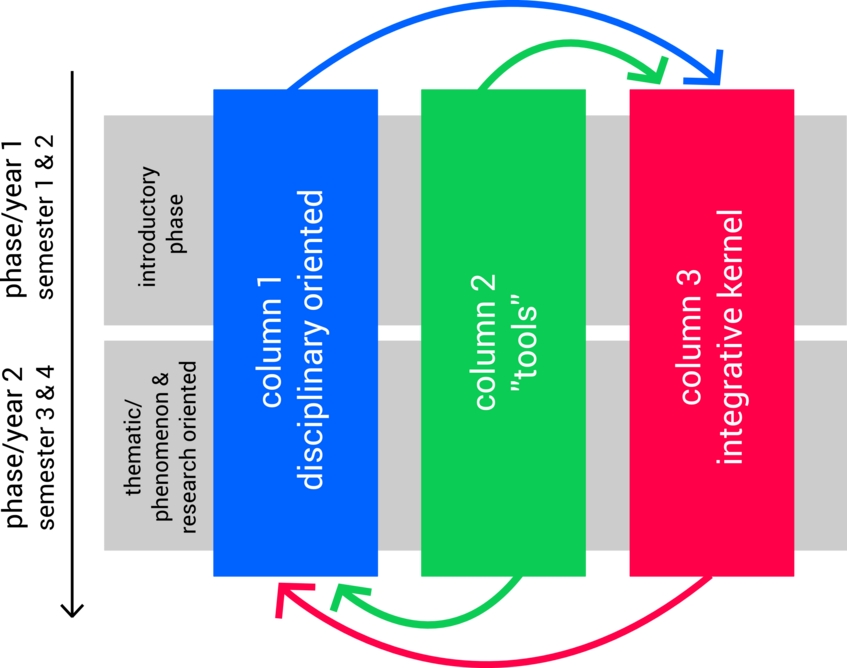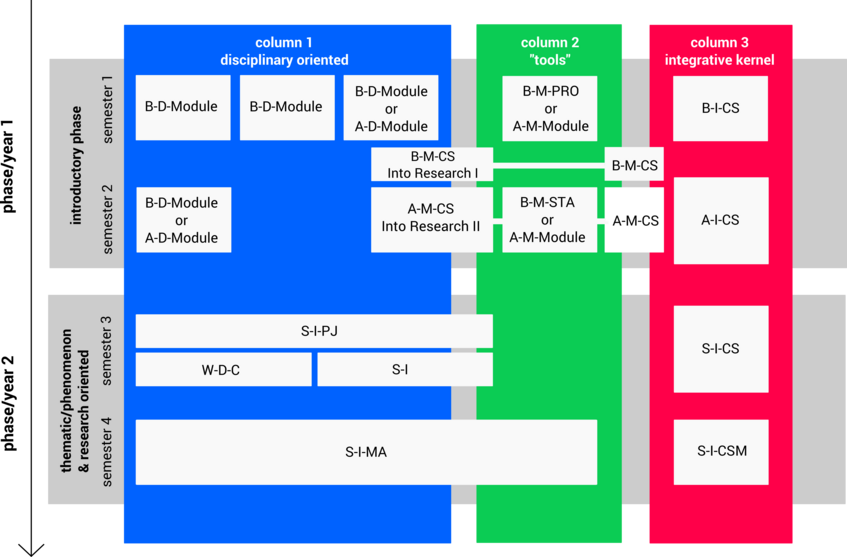Curriculum
Curriculum Architecture
The MEi:CogSci curriculum follows a two-dimensional architecture.
Vertically, it is organised in two phases, the "introductory phase" and the "thematic/phenomenon & research oriented phase". This is referred to as the "temporal organisation" (for details see below).
Horizontally, it is organised along three core themes relevant to MEi:CogSci: disciplines, methods, and integration. These aspects are the "functional organisation", referred to as "columns" within the curriculum. The are called the "disciplinary oriented column", "tools column", and the "integrative kernel column", respectively.

Temporal Organisation
The curriculum consists of two phases: the "introductory phase" and the "phenomenon and research oriented phase", consisting of two semesters each.
Introductory Phase (semester 1 & 2)
The introductory phase enables students to orient themselves in the field of cognitive science and provides a foundation for interdisciplinary research.
Students entering the programme differ greatly in terms of their disciplinary backgrounds and research interests. In the first year, students become familiar with theoretical concepts, methods, and cultures of the core disciplines of cognitive science.
Moreover, students are introduced to the current work of research groups from Vienna and the MEi:CogSci network.
Phenomenon and Research Oriented Phase (semester 3 & 4)
The phenomenon oriented phase builds on the (inter)disciplinary foundations laid in the first year. Through the integration of research methods and perspectives from multiple disciplines, students gain specialised knowledge of a chosen topic, focussing on a cognitive phenomenon. This phase is research and project oriented, and students conduct research based on their individual topic/phenomenon of interest.
This phase includes a mobility semester at one of the partner universities in the third semester, allowing students to further their studies and get to know other (scientific) cultures. See Mobility Semester.
In the fourth semester, students conduct their master's thesis.
Functional Organisation
Programme modules are depicted as three interconnecting columns: disciplinary oriented, "tools", and the integrative kernel.
The disciplinary oriented and the tools column provide students with conceptual, methodological, practical, and cultural experience of the core disciplines in cognitive science. The integrative kernel comprises courses for collaboratively reflecting upon, relating, and integrating these experiences, and provides training in cognitive science.
MEi:CogSci Vienna Curriculum Information
For more detailed information download the MEi:CogSci Vienna Curriculum Information document at the end of the page.
Modular Architecture
The modular architecture outlines the curriculum in more detail.

Figure 2: The modular structure of the curriculum.
Introductory Phase
Disciplinary Oriented Column
In the first year, students complement their disciplinary background knowledge by learning about other core disciplines of cognitive science. Thus, laying the foundation for interdisciplinary work. Students need to take four disciplinary modules. Selection of disciplinary modules depends on students' previous studies.
"Tools" Column
Depending on their background and previous studies, students choose a methods module: either programming (B-M-PRO), statistics (B-M-STA), or advanced methods modules (A-M-modules, e.g. advanced topics in programming, computational modelling, fMRI, EEG, philosophical argumentation, etc.)
Integrative Kernel Column
Students get to know the concepts and the culture of cognitive science in lectures, seminars, and interdisciplinary teamwork. The integrative kernel fosters cooperation and communication between students, and introduces them to current work of research from different core disciplines.
The first semester includes an introductory lecture, a lecture series, excursions to research labs (B-I-CS and B-M-CS “Into Research I”) and methodological courses (B-M-PRO, B-M-STA, or A-M-modules).
The second semester furthers students’ theoretical understanding of cognitive science and invites them to apply this knowledge to current cognitive phenomena (A-I-CS). Furthermore, students conduct project-based work at a lab or with a research group to gain first practical research experiences, and present their projects at the annual MEi:CogSci conference as a poster (A-M-CS “Into Research II”).
Phenomenon and Research Oriented Phase
Disciplinary Oriented and "Tools" Column
Drawing from their respective interests, background, and experiences of the first year, students choose a research topic focussing on a cognitive phenomenon.
In the third semester, students study abroad at one of our partner universities.
Depending on their research interest, students configure their special topic of interest to include practical research work and/or advanced courses from multiple disciplines (S-I-PJ, S-I).
Furthermore, they can take a foreign language course, or choose to take other courses regarding methodological or theoretical skills (W-D-C elective module).
In the fourth semester, students can pursue their master’s thesis either at their host location or back at their home university. The master’s thesis builds on and extends the conceptual and practical research done in the third or second semester.
Integrative Kernel Column
In the third semester at their host university, students have the opportunity to interact with their peers from all over the MEi:CogSci network. Students develop their interests and present and discuss their individual interdisciplinary projects.
Specifically, students conduct a regular journal club and attend a seminar exploring the implications of current trends in cognitive science (S-I-CS).
In the fourth semester, students present and critically discuss their projects in the master's thesis seminar and present their thesis at the annual MEi:CogSci conference at the end of the semester (S-I-MA, S-I-CSM).
